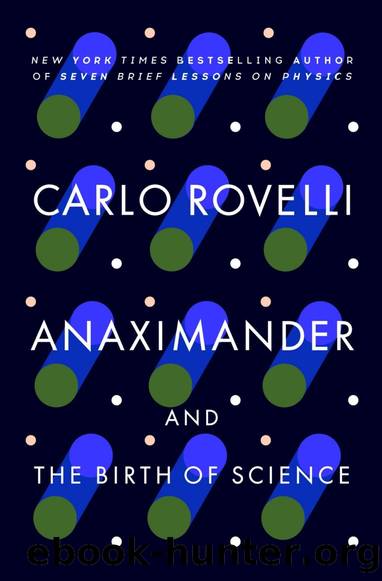The First Scientist: Anaximander and His Legacy by Carlo Rovelli

Author:Carlo Rovelli [Rovelli, Carlo]
Language: eng
Format: epub
ISBN: 9781594165351
Amazon: B00GPS3RDI
Publisher: Westholme Publishing
Published: 0101-01-01T00:00:00+00:00
SCIENCE CANNOT BE REDUCED TO VERIFIABLE PREDICTIONS
To be sure, we can find reliability in science despite these uncertainties. Newtonâs theory is not less valuable after Einstein. Anyone who needs to calculate the force of wind on a bridge can use either Newtonâs theory or Einsteinâs. The difference in results will be exceedingly small and utterly irrelevant for the practical issue of constructing a bridge that will not collapse. Newtonâs theory, then, is perfectly adequate to this problem and gives us fully trustworthy results (and ones much simpler to use).
Theories have domains of validity determined by the precision with which we observe the world and by the regimes in which the observed phenomena are situated. Newtonâs theory remains valid and reliable for all objects that move much slower than the speed of light, such as a bridge or the wind. In some ways, Newtonâs theory is actually strengthened by Einsteinâs work, because now we know for sure its criteria of applicability. If a calculation based on Newtonâs equations determines that a roof under construction is too thin and will collapse with the first snowfall, we would be complete fools to dismiss it on the ground that, after Einstein, Newton is not valid anymore.
Because of this kind of certainty, we can happily rely upon science. For example, if we have pneumonia, science tells us that we have a substantial probability of dying if we do nothing, but we are very likely to survive if we take penicillin. This knowledge cannot be questioned: we can be certain that the probability of survival rises significantly with penicillin, whether or not we have any deep understanding of what precisely pneumonia is. The increase in the probability of survival, within established margins of error, is a certain scientific prediction.
We can thus content ourselves to consider a theory interesting only insofar as it gives us predictions valid within a certain realm and within given margins of error. In fact, one might say that generating predictions is the useful and trustworthy part of a theory, the rest being irrelevant baggage.
That is the conclusion of some of todayâs philosophers of science. Reasonable, but, to me, not convincing. Is the world as Newton describes it, or Einstein, or neither? If neither, is there anything we know about the world? If all we can say is that certain equations are useful for calculating certain physical phenomena within certain margins of error, then we do not leave science any capacity to help us understand the world. Despite our scientific knowledge, the world remains utterly incomprehensible.
The problem with such a reduction of science to verifiable results is that it fails to do justice to the practice of science, the way it actually grows, and above all to the actual use that we make of it, which is the reason why science ultimately interests us. I explain with an example.
What did Copernicus discover? According to the understanding of science just outlined, he discovered nothing at all. Copernicusâs predictive system is less accurate, not more, than Ptolemyâs.
Download
This site does not store any files on its server. We only index and link to content provided by other sites. Please contact the content providers to delete copyright contents if any and email us, we'll remove relevant links or contents immediately.
The Daily Stoic by Holiday Ryan & Hanselman Stephen(3287)
The Fate of Rome: Climate, Disease, and the End of an Empire (The Princeton History of the Ancient World) by Kyle Harper(3045)
People of the Earth: An Introduction to World Prehistory by Dr. Brian Fagan & Nadia Durrani(2718)
Ancient Worlds by Michael Scott(2659)
Babylon's Ark by Lawrence Anthony(2658)
The Daily Stoic by Ryan Holiday & Stephen Hanselman(2560)
Foreign Devils on the Silk Road: The Search for the Lost Treasures of Central Asia by Peter Hopkirk(2451)
India's Ancient Past by R.S. Sharma(2438)
MOSES THE EGYPTIAN by Jan Assmann(2406)
The Complete Dead Sea Scrolls in English (7th Edition) (Penguin Classics) by Geza Vermes(2268)
The Earth Chronicles Handbook by Zecharia Sitchin(2211)
Lost Technologies of Ancient Egypt by Christopher Dunn(2210)
24 Hours in Ancient Rome by Philip Matyszak(2071)
Alexander the Great by Philip Freeman(2052)
Aztec by Gary Jennings(2008)
The Nine Waves of Creation by Carl Johan Calleman(1901)
Curse Tablets and Binding Spells from the Ancient World by Gager John G.;(1856)
Before Atlantis by Frank Joseph(1842)
Earthmare: The Lost Book of Wars by Cergat(1813)
